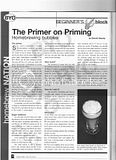MattC8
Member
- Joined
- 18/7/10
- Messages
- 14
- Reaction score
- 0
Hello All,
I a new brewer with only 4 brews completed. I have a question (or two) about bulk priming. I have managed to secure a number of Grolcsh bottles from a mate (a former home brewer) and I know I should bulk prime as they are different sizes.
What sugar should I use? Normal white, Dextrose, brewing sugar etc... I am not sure. I intend to bulk prime for the first time tomorrow and was planning to use dextrose, but my LHBS advised me to use plain white sugar. This is different to other advice I've received from friends who brew. What difference does it make? The guy at the shop was a bit vague about the reasons why. Can anybody explain. I had a look at the Palmer How to Brew site, but there is no mention of Dextrose for priming there. Any advice?
Regards,
Matt
I a new brewer with only 4 brews completed. I have a question (or two) about bulk priming. I have managed to secure a number of Grolcsh bottles from a mate (a former home brewer) and I know I should bulk prime as they are different sizes.
What sugar should I use? Normal white, Dextrose, brewing sugar etc... I am not sure. I intend to bulk prime for the first time tomorrow and was planning to use dextrose, but my LHBS advised me to use plain white sugar. This is different to other advice I've received from friends who brew. What difference does it make? The guy at the shop was a bit vague about the reasons why. Can anybody explain. I had a look at the Palmer How to Brew site, but there is no mention of Dextrose for priming there. Any advice?
Regards,
Matt





